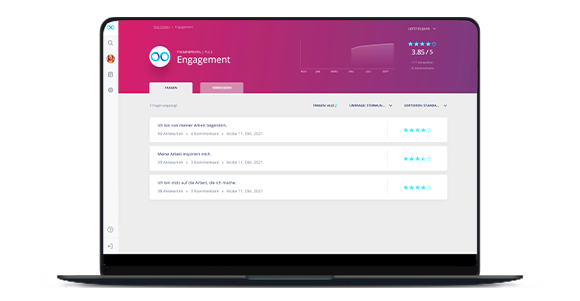
Corporate Learning Culture to Stay Competitive
22.06.2022
War for talent, digital transformation, shortage of skilled workers - the traditional employer market has taken a beating in recent years. Not only do job profiles evolve continuously, but employees also have the motivation to grow and take on new challenges. Our number one recommendation for companies to retain existing employees and attract new talent? Establish a positive learning culture.
What defines a learning culture?
The concept behind a corporate learning culture describes the company's positioning on internal development opportunities for employees. Both, the overall attitude towards a continuous learning process as well as the provided framework, play an important role in this regard. In short, a corporate learning culture is all about the relevance directed towards creating learning opportunities within the company.
What's the catch you wonder? For one, you as a company will make sure your employees' skills are continuously increasing, which has a direct impact again on your company's success. And not to forget of course: being know for investing in your employees is a massive signalling and will attract new talent.
Why do you need a learning culture?
It doesn't matter which industry you're in, factors such as digitalization, demographic change and globalization - not to mention various crises - demand continuous growth. To meet these challenges and remain competitive, you need to develop the collective skills within your company. And where do skills reside? Precisely, your employees.
It is important to understand which competencies are already there and where there are potential gaps. Once identified, these gaps could be tackled with promoting an exchange of knowledge between different departments. In addition, all employees should be able to actively contribute to their further development. You will be surprised where some interests lie and what potential this can hold for you.
Another point in favour of an active learning culture in your company is the attraction of new talent. When choosing a new employer, an increasing number of applicants sees the opportunity for on-the-job development as a high priority. On-the-job learning. If you as a company offer exactly this and also communicate it, this leaves a lasting impression on talents and speaks for you in case of doubt. Also, with a learning culture, you're setting an example to your employees of exactly what you need in a highly dynamic environment: Curiosity, flexibility and the courage to learn new things.
How do you establish a learning culture?
Employees should be given a basic orientation on where the learning potential lies in their current role and where the journey can take them. To ensure a structured approach, you need goals, resources, and the active support and involvement of supervisors.
- Define two to three skills with your employees that are relevant for both the current role and future positions. This not only creates motivation to learn but also perspective.
- Have all employees write down short- and long-term goals with a focus on the operational level and the development of previously defined skills. This provides structure in the career planning of your employees.
- Enable learning from anywhere, anytime. This means making learning opportunities digitally accessible and using tools that ensure inclusion.
- Encourage exchange between colleagues and thus learning from each other. This offers different perspectives and continues to strengthen your company's competitiveness thanks to active knowledge exchange.
- Invest in user-centric technologies that make learning attractive.
- Train your managers to hold meetings about the development process with their respective employees on a regular basis.
Skill development thanks to continuous feedback
We would like to revisit the last point here, because regular feedback meetings truly are a game changer. They provide an excellent starting point for understanding the status quo and will hold everyone accountable. Questions for this purpose could look like the following:
- What learning opportunities currently exist?
- Where is the current company focus and why is that?
- Can the entire workforce access all learning tools?
- How are the current learning opportunities being used?
- Are interests covered?
- Are there areas that are strategically important to the company but are not yet being offered?
There will of course be adjustments needed to continuously improve and expand the learning opportunities provided. What's needed to do that? Exactly: feedback.




